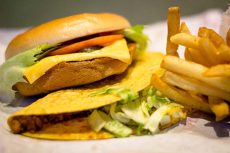By Colt Taylor/ campus editor

Bogdan Sierra Miranda/The Collegian
Tests, quizzes, reports, exams. With all the challenges college presents, getting a good meal three times a day shouldn’t be one of them.
Food can be expensive, and healthy food even more so, but with a little planning and forethought, students can have healthy meals ready to go anytime they need them.
“Oftentimes, I just eat whatever I can make quickly or whatever I can get for cheap,” SE student Breanna Douresseau said.
Between class, study, work and other daily activities, students have a tendency to eat whatever is most convenient, resorting to fast food and other less healthy but more available options.
“I just eat whatever, and I go out to eat a lot — fast food and stuff,” SE student Tomas Moquete said.
Students don’t need to whittle away their savings on these overpriced options, though. HPE associate professor Melissa Evans and culinary arts instructor Katrina Warner offer some advice to help students eat right, save money and work around a tight schedule.
Finding time to eat before or between classes can prove difficult, but Evans suggests a time-saving strategy called batch cooking. During the weekend, or any time it’s convenient, she said to cook an entire bag of chicken. Then one can divide the chicken into bags for each night of the week and season each differently. After morning classes or in the evening, that day’s bag of chicken can be reheated along with some frozen vegetables for a healthy, tasty meal in mere minutes. Warner and Evans agree that frozen vegetables are the best option as they retain the peak amounts of nutrients they contained at the time of being picked.
Evans said an alternative to batch cooking is crockpot cooking. These meals cook over a long period of time allowing one to come home to hot meals which began cooking that morning.
While these strategies cover two out of three daily meals, breakfast remains one of the more difficult meals for students to prepare.
“I’m not much of a morning person,” Douresseau said. “And as such, I rarely wake up early enough to make breakfast for myself.”
Breakfast doesn’t have to include buttered pancakes and some fancy eggs. Fruit, nuts or fruit dipped in peanut butter is a fast, healthy option, Evans said.
“Fruits are nature’s fast food,” she said.
If students suffer from nut allergies, alternative sources of protein for breakfast include eggs, chicken and salmon if possible, Evans said.
In a similar fashion to batch meals for lunch and dinner, Evans also suggests smoothies made from Greek yogurt, fruits and even vegetables as a healthy breakfast option as well. Adding spinach will make the drink even healthier without affecting the taste as the fruit will overpower the spinach flavor, she said. Smoothies can be made the night before and left in a refrigerator.
Whether making meals from scratch or starting with an instant meal as a base, students can find many ways to improve everyday meals in healthy and tasty ways. When chowing down on instant ramen, mac and cheese or some good old canned soup, students have the option of adding their own special ingredients. Warner recommends sauteing vegetables to add into the dishes. Peas, green beans, chopped broccoli, canned diced tomatoes, shredded kale and spinach can all be added to improve the taste and healthiness of instant meals, she said.
When it comes to cooking in general, students should always be on the lookout for healthier methods to swap out. Deep frying can be swapped with pan frying for most dishes, and pan frying can be swapped with sautéing or stir frying, Warner said. Avocado oil and olive oil are more expensive but much healthier alternatives than regular cooking oils. Evans said to consider them an investment in one’s health.
Money-savvy chefs will want to get the most product for their money and get the most use possible out of it. When it comes to price for quality, Warner recommends shopping at Aldi or H-E-B if possible. For students in a rush, 7-Eleven and other convenience stores sell bananas and other fruits cheaply, Evans said.
When preparing batch meals that contain fruits or vegetables, Warner advises students to dip them in water with lemon juice beforehand. The acid in the lemon juice will help to preserve the fruit causing it to brown much more slowly than normal.






























